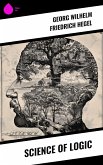Georg Wilhelm Friedrich Hegel's "Philosophy of Mind" offers a profound exploration of consciousness, self-awareness, and the development of human spirit. Part of his larger work, the "Encyclopaedia of the Philosophical Sciences," this text employs a dialectical method that reflects the complexity of human experience and its progression through different stages of awareness-both individual and collective. Hegel's literary style is characterized by dense, nuanced prose that challenges readers to engage deeply with his philosophical inquiries, situating his work within the German Idealism movement, which seeks to reconcile the material and spiritual dimensions of reality. Hegel, a towering figure in Western philosophy, crafted this seminal work amidst the intellectual upheaval of the 19th century, drawing on the ideas of Kant and Spinoza while offering a distinct perspective on the evolution of thought and self. His background in theology and engagement with the social currents of his time informed his views on the interconnectedness of mind and reality, ultimately positing that the evolution of consciousness reflects a universal rational structure. "Philosophy of Mind" is essential reading for anyone seeking a comprehensive understanding of Hegelian thought. It invites the reader into a rich examination of human consciousness that is as relevant today as it was in Hegel's time, making it an invaluable resource for philosophers, students, and anyone interested in the dynamics of mind and spirit.
Dieser Download kann aus rechtlichen Gründen nur mit Rechnungsadresse in A, B, BG, CY, CZ, D, DK, EW, E, FIN, F, GR, HR, H, IRL, I, LT, L, LR, M, NL, PL, P, R, S, SLO, SK ausgeliefert werden.









